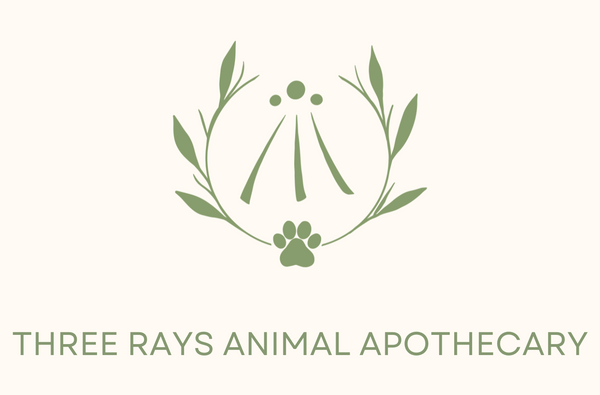In an age where health and sustainability are paramount, the materials we use to package our food, pet products, and household items have a significant impact on both personal wellbeing and the environment. At Three Rays Animal Apothecary, we’ve made the conscious decision to use glass packaging for all of our products. Here’s why glass is the better choice over plastic for you, your pets, and the planet.
Healthier for You and Your Pets
One of the primary reasons we use glass packaging is because of its non-toxic nature. Plastic containers, especially those made with BPA, phthalates, or other harmful chemicals, can leach toxins into the contents they hold. Over time, exposure to these chemicals can lead to a range of health issues, from hormonal imbalances to chronic conditions—concerns that extend to our pets as well.
Glass, on the other hand, is completely inert, meaning it doesn’t interact with its contents. This ensures that the food, herbs, or extracts we package stay free of chemical contamination. When you choose products packaged in glass, you can feel confident that what you’re feeding your pet or storing for later use remains pure and safe.

Environmentally Friendly and Sustainable
At Three Rays Animal Apothecary, we prioritise sustainability, which is why glass packaging is central to our eco-friendly practices. Plastic packaging is a major contributor to environmental degradation, with millions of tons ending up in landfills and oceans every year. Plastic takes centuries to decompose, often breaking down into harmful microplastics that pollute ecosystems and threaten wildlife.
Glass, however, is 100% recyclable and can be reused infinitely without losing quality. Our amber glass bottles and jars make beautiful vases! By opting for glass, we’re helping to reduce the environmental burden of waste while offering our customers a packaging option that’s truly sustainable. Each time you purchase our products in glass, you’re supporting a greener future for all.
The Advantages of Amber Glass
Amber glass offers additional benefits due to its UV-blocking properties. The amber colour protects sensitive contents, such as essential oils, herbs and other extracts, from harmful UV rays that can degrade their quality. This makes amber glass especially effective in preserving the potency and freshness of products over time. Its impermeability to air and moisture also ensures that the contents remain fresh and effective longer than with plastic alternatives.

Preserving Product Quality
Overall, glass is renowned for preserving the quality of its contents. It provides a superior barrier against air and moisture, which helps maintain freshness and flavour. Amber glass enhances this protection by shielding contents from UV light, making it an ideal choice for products that require extra care to maintain their integrity.
In conclusion, our decision to use glass packaging is rooted in our commitment to your health, your pets’ wellbeing, and the planet. By choosing products packaged in glass, you’re making a healthier choice for your household and taking a meaningful step toward reducing plastic waste. Together, we can create a healthier, more sustainable world.

References / Additional Resources:
Lawless, H. T., & Heymann, H. (2010). Sensory Evaluation of Food: Principles and Practices.
National Geographic. (2020). "The Environmental Impact of Plastic Packaging." Retrieved from National Geographic Article
NSW Environmental Protection Authority. (2012). "Energy Savings In Each Bottle". Retrieved from NSW EPA.
Otterstedt, J. (2019). "UV Protective Packaging for Pharmaceuticals." Journal of Packaging Technology.
Rajmohan, K. S., Chandrasekaran, R., & Varjani, S. (2023). "Plastic Pollution: How Can The Global Health Community Fight The Growing Problem?". Retrieved from NIH.
The European Container Glass Federation "Is Glass a Sustainable Material?". Retrieved from The European Container Glass Federation
United Nations Development Program. (2023). "Microplastics in Human Health: How Much Do They Harm Us?". Retrieved from UNDP.
Wypych, G. (2019). Handbook of Polymers. ChemTec Publishing.


